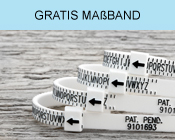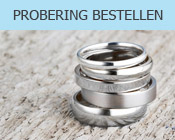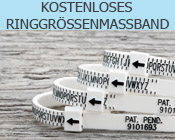Stainless Steel
Stainless steel is a popular metal for use in wedding rings or dress/fashion rings alike because of its budget-friendly price and because it is easy for jewellers to work with. Other types of steel are either not as durable, or too tough for the craftsmanship required.
Stainless steel is a generic term for a group of about 150 grades of steel, first used for cutlery but now widely used for steel in many industries. The most popular grade is 316L; several different grades of steel can be termed stainless, but the metal must contain a minimum of 10.5% chromium – usually 13%. The chromium is what differentiates the metal from carbon steel and is what protects it from corrosion. Stainless steel will therefore be relatively resistant to corrosion for the required environment or application. The chromium forms an invisible oxidised layer on the outside of the ring, which is too thin to be visible but protects the ring against water and air. When the ring is scratched, the layer quickly reforms. This phenomenon is called passivation.
Stainless steel properties
As well as being resistant to corrosion and tarnishing, stainless steel is relatively strong and durable. The metal is antibacterial and unlikely to cause an allergic reaction, although most grades of steel are not hypoallergenic – only surgical steel can be given this title.
Stainless steel is 100% recyclable, and a typical stainless steel ring contains 60% recycled product.
Stainless steel wedding rings
Stainless steel is slightly whiter than titanium and zirconium, but still has the contemporary metallic look and won't be quite as white as the precious metals such as platinum and silver.
A ring being stain-resistant and durable should not be confused with stain-proof or infallible. All metal rings will show some signs of wear and tear in the weeks, months and years of use; and all types of jewellery need your care and attention to avoid long-term damage.
How to clean stainless steel rings
Your stainless steel wedding band can be kept at its best by frequent wiping with a soft cloth to ensure dust and dirt is removed regularly. Be gentle and follow the contours/grain to ensure moving the dirt doesn't scratch the ring. You can wash the ring in a mild soapy solution and dry carefully, again with a soft cloth. Toothpaste is good for removing marks that have set in, as long as it doesn't contain silica. Stainless steel polish is readily available and can be used with care on jewellery.
More information
Please view our Steel Wedding Ring range













